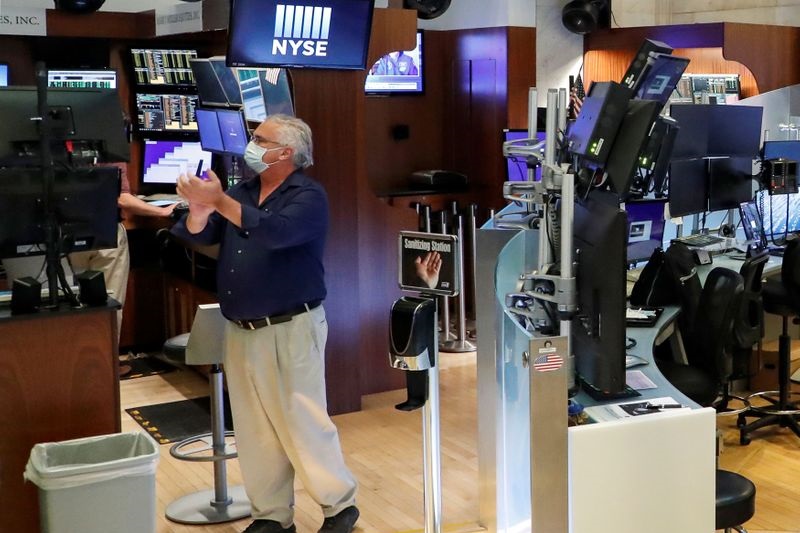By Geoffrey Smith
Investing.com -- The U.S. nears a big milestone on its economic reopening. The U.K. likewise. Factory orders and trade data for March are due. Pfizer (NYSE:PFE), CVS, T-Mobile and Under Armour (NYSE:UA) all give their two cents' worth on the progress of vaccination and reopening, with stocks struggling to get over the gain line in premarket. And carbon dioxide emissions futures are the latest commodity to hit an all-time high. Here's what you need to know in financial markets on Tuesday, May 4th (Happy Star Wars Day!)
1. A broad reopening
New York, New Jersey and Connecticut said they will lift most coronavirus-related restrictions on business and social life within two weeks, in another milestone toward the full reopening of the U.S. economy.
New York Governor Andrew Cuomo told a press conference on Monday that capacity restrictions on offices, theatres and museums will be lifted from May 19. Stores, gyms and bars will also be able to return to a normal working regime. The NYC subway will also return to a 24-hour service on the same day.
In the U.K., meanwhile, Prime Minister Boris Johnson said indoor hospitality should be open again from May 17, the same day that international travel restrictions are due to be eased. All remaining social distancing requirements are likely to be lifted from June 21, he added. Like Cuomo, Johnson is under pressure to deflect attention away from unrelated scandals that are generating more headlines than the pandemic.
On Monday, the European Union had also unveiled plans to relax bans on international travel.
2. Factory orders, trade data due as factories scramble for inputs
Those looking to track the recovery in numbers rather than restrictions can look forward to the release of factory orders data for March at 10 AM ET (1400 GMT). They’ll be preceded by U.S. trade balance data for March at 8:30 AM ET.
The orders data will be published a day after the Institute for Supply Management’s purchasing managers survey reported an all-time high for its orders subindex, which the ISM said reflected pent-up demand for a broad range of goods. Inventories, meanwhile, hit an all-time low.
Progress in restocking is set to depend to a large extent on ironing out disruptions in supply chains: the ISM survey’s prices paid index skyrocketed to a 13-year high of 89.4, indicating desperation on the part of buyers. Semiconductors continue to be the most acutely disrupted segment, with Germany’s Infineon (OTC:IFNNY) warning overnight that the slow restart of its Texas factory after February’s blizzards will weigh on sales throughout the current quarter.
3. Stocks set to open mostly lower; earnings torrent set to resume
U.S. stock markets are set to open mostly lower, with the quickening pace of economic reopening again favouring cyclical stocks and Dow Jones futures.
By 6:30 AM ET Dow Jones futures were unchanged, while S&P 500 futures were down 0.1% and Nasdaq 100 futures were down 0.3%.
It’s a heavy day for earnings again, with updates due from Pfizer, T-Mobile (NASDAQ:TMUS), CVS Health (NYSE:CVS), Global Payments (NYSE:GPN), Activision Blizzard (NASDAQ:ATVI), DuPont de Nemours (NYSE:DD), Match Group (NASDAQ:MTCH), Verisk (NASDAQ:VRSK) and Under Armour, among others.
Under Armour stock rose just less than 1% in after-hours trading on Monday after agreeing to pay $9 million to settle an SEC probe into its accounting practices. No enforcement action will be taken.
4. CO2 futures break new records
At a time when most commodities are rallying hard, one is hitting new records almost every day.
Futures on emissions trading rights under the EU’s CO2 trading scheme hit 50 euros a ton for the first time on Tuesday, thanks to a combination of speculative activity and the tendency of high-polluting firms covered by the scheme to put off remedial measures to offset excess emissions until the last minute.
Prices have doubled since December, as the industrial recovery from the pandemic began to accelerate, forcing companies to mitigate an unexpectedly sharp rebound in their emissions. The EU is due to discuss expanding its emissions trading scheme on May 23 to cover more sectors of industry, as part of its broader strategy to reach carbon neutrality.
Higher-value carbon products were also in the news elsewhere, as Pandora (CSE:PNDORA) (OTC:PANDY) said it would stop using mined diamonds in its jewellery, in a move aimed at sharpening its ESG profile
5. Aramco churns out almost enough cash to pay its dividend; API inventories due.
Meanwhile, back in the old energy world, Saudi Aramco (SE:2222) posted a sharp increase in profit in the first quarter of 2021, as output restraint underpinned a sharp rally in crude prices.
The world’s largest oil company reported a profit of $21.7 billion and free cash flow of $18.2 billion. The latter wasn’t quite enough to cover a dividend payout of $18.7 billion that remains the world’s largest.
Crude prices forged higher on Tuesday, encouraged by the latest news on reopening in the U.S. and Europe, which seems likely to unfreeze the market for jet fuel. U.S. crude prices were up 1.7% at $65.61 a barrel, while Brent crude was up 1.9% at $68.81 a barrel. The American Petroleum Institute releases its weekly inventories data at 4:30 PM ET, as usual.
